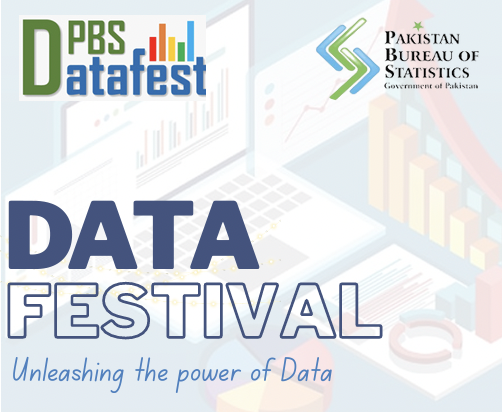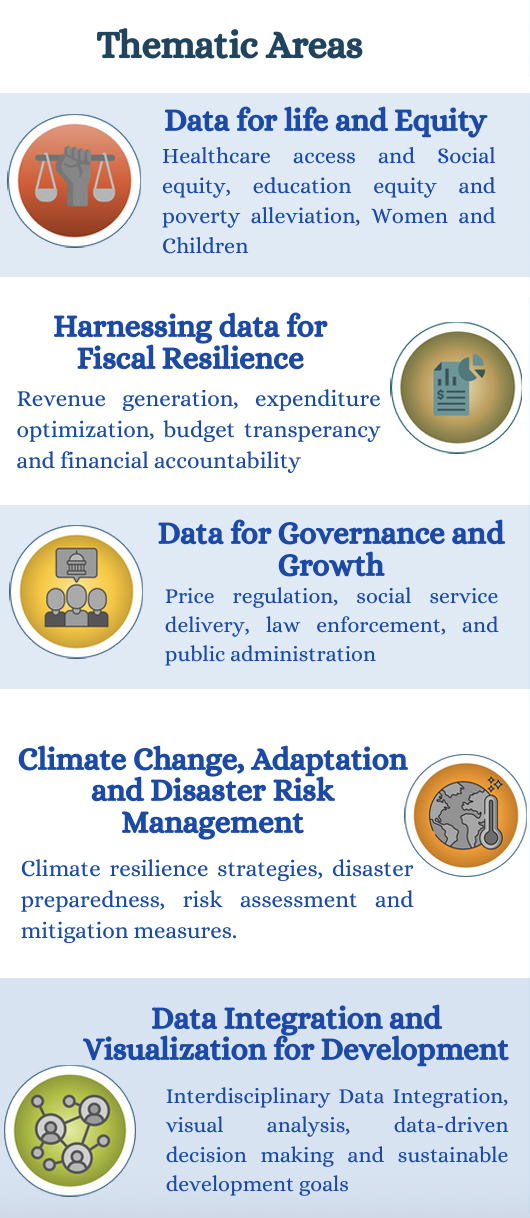The Pakistan Bureau of Statistics (PBS) is leading a transformative initiative through DataFest 2024, scheduled for October 21-22, 2024. This event will unite stakeholders from diverse sectors to explore the power of data in shaping the nation’s future, and a movement toward data-driven governance and innovation. Bringing together over 300 participants, including businesses, universities, government bodies, research organizations, and data experts, DataFest 2024 promises to be a game-changing platform for collaboration, innovation, and knowledge exchange.

At DataFest 2024, experts will explore how data can be utilized across various sectors to improve governance and resilience.
By identifying gaps in service delivery or highlighting areas of potential growth, data empowers policymakers to make more accurate and effective decisions. This is particularly crucial for countries like Pakistan, where diverse challenges—from fiscal constraints to climate change—require precise, data-driven interventions.
Data as a Driver for Sustainable Development
A recurring theme in DataFest 2024 will be the role of data in achieving Pakistan’s Sustainable Development Goals (SDGs). According to Dr. Zafar, Pakistan’s progress towards SDG targets has been hindered by fragmented data ownership and poor data sharing between institutions. He explains,
“One of our major challenges is that different entities hold onto their data. There’s a reluctance to share it across departments.”
Addressing this challenge will require fostering a culture of collaboration and data-sharing across institutions. Dr. Zafar argues that building a strong case for data-sharing will lead to better software solutions and infrastructure down the road.
“If we can move beyond this mindset and start sharing data across institutions, we can make far better decisions, especially in areas like SDG implementation.”
This landmark event aims to harness the power of data in driving Pakistan’s development, bringing together a diverse array of participants, including businesses, universities, government agencies, research organizations, and data experts. With over 300 attendees expected, the event will serve as a platform for collaboration, innovation, and knowledge exchange, enabling stakeholders to explore the full potential of data in improving governance, fostering innovation, and supporting social development.
Participants from various sectors will converge at DataFest 2024, including representatives from federal and provincial government agencies, local government bodies, regulatory authorities, public sector enterprises, and academia.

Research institutions and think tanks, along with public-private partnerships and development authorities, will also be actively involved. The event will attract tech companies, data analytics firms, startups, and innovators, as well as large corporations, small and medium enterprises, financial institutions, and private healthcare and education providers.
Additionally, key civil society players, including human rights organizations, development NGOs, and environmental groups, will engage in the discussions. International organizations such as UN agencies, international development agencies, and INGOs will contribute their expertise, alongside leading private associations like P@SHA, APTUF, PPMA, APTMA, FPCCI, PMA, and PBC.
DataFest 2024 will feature a variety of interactive formats. Participants will benefit from keynote presentations delivered by industry and thought leaders, offering insights into the future of data in shaping Pakistan’s progress. Panel discussions will bring together experts to explore governance, fiscal resilience, climate adaptation, and more.
Breaking Silos in Big Data
One of the significant challenges that DataFest 2024 seeks to address is the culture of big data produced in silos. The festival aims to encourage dialogue and collaboration among various data stakeholders, facilitating communication between data producers and users.
A massive challenge Dr. Zafar highlights in his interview is the problem of siloed data systems. Across Pakistan’s institutions, data often remains locked within departments, preventing its full potential from being realized. He adds,
“Different entities hold onto their data, and this limits the country’s ability to make informed decisions. We need to bring these silos down and start sharing data across sectors”
This is where the vision of DataFest 2024 comes into play. For Dr. Zafar, DataFest is not just an event—it’s an effort to break the traditional barriers that keep data fragmented. Through its thematic areas—Data for Life, Governance, Fiscal Resilience, Climate Adaptation, and Development (covering sectors like health, education, AgriTech, and finance)—the event will showcase how collaborative use of data can drive national development.
Fostering Collaboration: The Core of DataFest
A key goal of DataFest is to create a cultural shift—transforming the inertia that comes from siloed data practices into excitement and shared clarity about the mutual benefits of collaboration. For Dr. Zafar, the event is about more than just showcasing products; it’s about fostering relationships that will continue well beyond the festival.
“We’re trying to spark long-term collaborations between the public and private sectors. Once people see the practical benefits of sharing data—whether it’s improving healthcare outcomes or optimizing supply chains—they’ll be more open to partnerships.”
By conceiving DataFest as a collaborative effort focused on business and use cases, the event will drive discussions around thematic areas such as Data for Life and Equity, Harnessing Data for Fiscal Resilience, and Data for Governance and Growth, among others. This collaborative environment will pave the way for innovative approaches to data sharing, ultimately fostering a more integrated and effective use of data in addressing national challenges.
“Collaboration is key. If we can make these data silos talk to each other, we will be able to tackle complex problems with the right resources, at the right time,” he emphasizes.
The Marketplace for Data-Driven Solutions
DataFest 2024 is designed to be more than just a conference—it’s a marketplace. Here, data producers and developers will have the opportunity to showcase their products, services, and impact across various sectors. This marketplace will serve as a dynamic space for interaction, allowing participants to engage with one another and explore potential collaborations.
“The marketplace concept is crucial. We’re not just talking about data as a static resource. We’re showing how it can drive practical, scalable solutions for industries like healthcare, agriculture, and financial services.”
At the heart of the event are the expo areas, where stakeholders from research institutions, development partners, and tech startups will conduct sessions and present their projects. These unstructured, interactive workstations will allow participants to collaborate in real time, discussing innovative solutions and forming partnerships.
Key Thematic Areas
The central themes of DataFest 2024 revolve around critical areas where data can serve as a catalyst for positive change. One major theme is Data for Life and Equity, which focuses on addressing issues such as healthcare access, social equity, educational equality, and poverty alleviation through data-driven insights.
Another key theme is Harnessing Data for Fiscal Resilience, where discussions will explore how data can enhance revenue generation, optimize public expenditure, promote budget transparency, and improve financial accountability. Data for Governance and Growth will spotlight the role of data in price regulation, law enforcement, social service delivery, and public administration.

In addition, the theme of Climate Change, Adaptation, and Disaster Risk Management will examine strategies for building climate resilience, disaster preparedness, and risk mitigation through data.
Lastly, Data Integration and Visualization for Development will demonstrate how interdisciplinary data integration and visual analytics can drive sustainable development goals and inform decision-making.
Attendees will also have the opportunity to participate in hands-on workshops, which will focus on building data literacy, developing data visualization skills, and applying data to practical challenges. In the exhibition area, tech companies, data firms, startups, and other organizations will showcase their products and services, creating a dynamic marketplace for data exchange.
Networking sessions will facilitate collaboration between data producers and users, while data product demonstrations will offer real-world applications of innovative data solutions.
The Future of Pakistan’s Data Landscape
A key objective of DataFest 2024 is to foster collaboration among stakeholders. By bridging the gap between data producers and users, the event seeks to promote a culture of data sharing and integration that can generate holistic insights for informed decision-making. The festival will also emphasize the importance of data-driven innovation, encouraging the development of new ideas and solutions that address national challenges.
Dr. Zafar is optimistic about the role of data in shaping Pakistan’s future.
“Initiatives like DataFest are helping to drive a cultural shift. More and more sectors are starting to recognize the value of data-driven insights,” he notes.
As data becomes increasingly central to governance, economic planning, and development, Pakistan will need to build the capacity and infrastructure necessary to harness this growing demand for insights. For Dr. Zafar, this means investing in human resources, technology infrastructure, and fostering inter-institutional collaboration.
Additionally, DataFest will work to promote data literacy among participants, equipping them with the knowledge and skills needed to leverage data for progress in their respective fields. This collaboration will ultimately foster greater awareness of available data, encourage its efficient use, and contribute to the broader development goals of Pakistan.
The target audience for DataFest 2024 is diverse, encompassing students, educators, researchers, government organizations, private businesses, international organizations, and the general public. By engaging these groups, DataFest aims to spark a nationwide conversation on the importance of data and its potential to transform decision-making, governance, and innovation.

Through initiatives like DataFest 2024 and ongoing efforts to improve data collection and analysis, PBS is setting the stage for better governance and economic resilience. Whether it is optimizing tax collection or assessing the impact of public policies, the availability of high-quality data can significantly improve the government’s ability to respond to the nation’s needs.
Together, these participants will work on harnessing the potential of data to foster economic growth, drive innovation, and promote social development across Pakistan. Dr. Zafar is optimistic that the event will set the tone for future collaboration in Pakistan’s data ecosystem.
“We’re building a foundation for the future. Data is the key, but it’s collaboration that will unlock its true potential,” he concludes.
DataFest 2024 is more than just an event—it is a platform for unlocking the full potential of data in Pakistan. By promoting collaboration, fostering innovation, and driving data literacy, the festival will create new opportunities for national progress and development. For more information, visit www.pbs.gov.pk/pbs-datafest-2024 or follow @pbsofficialpak.








